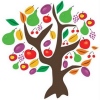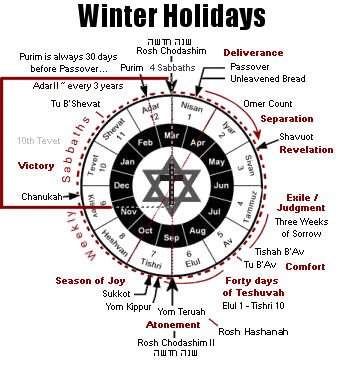|
|
|||||||||||||||||||||
 |
|||||||||||||||||||||
|
Learn Hebrew |
|||||||||||||||||||||
|
|
||||||||||||||||||||||||||||||||||
|
Introduction |
|
The month of Shevat (ūŚūōū® ū®ūæūś) is the eleventh month of the Jewish calendar (counting from the month of Nisan). The name "Shevat" (ū®ūüų░ūæųĖūś) was adopted by the Jewish people sometime during the Babylonian exile, though it is explicitly mentioned in the Scriptures: On the twenty-fourth day of the eleventh month (ūæų╝ų░ūóųĘū®ūüų░ū¬ų╝ųĄūÖųŠūóųĖū®ūéųĖū© ūŚūōųČū®ūü), which is the month of Shevat (ūŚūōųČū®ūü ū®ūüų░ūæųĖūś), in the second year of Darius, the word of the LORD came to the prophet Zechariah... (Zech. 1:7) The month of Shevat is considered important since the Scriptures state that Moses began his summary of the Torah (i.e., Mishneh Torah, or the sermon recorded in Book of Deuteronomy) on the first day of this month: "These are the words that Moses spoke to all Israel beyond the Jordan in the wilderness ... in the fortieth year, on the first day of the eleventh month [i.e., Shevat] (ūæų╝ų░ūóųĘū®ūüų░ū¬ų╝ųĄūÖųŠūóųĖū®ūéųĖū© ūŚūōųČū®ūü)" (Deut. 1:1,3)
|
|
Tu B'Shevat - New Years for Trees |
|||
|
According to the great Torah sage Hillel the "Rosh Hashanah for Trees" occurs on the 15th of Shevat (i.e., Tu B'Shevat). This was originally the date selected when tithes (ma'aser) from fruit trees were due to be given to the priests, though now it is observed throughout modern Israel as a sort of national "Arbor Day." It is customary for children to plant trees in the land of Israel (or to donate money to help plant trees in Israel). It is also tradition to eat a new fruit from the Land of Israel on this date in order to recite the blessing over fruit trees and the Shehecheyanu blessing. Some people stay up all night on Tu B'Shevat reciting all the passages from the Scriptures (and other traditional literature) that relate to fruit, being fruitful, etc. This is somewhat similar to the custom of tikkun leil Shavuot (i.e., reading excerpts from the all the books of Tanakh and the Mishnah throughout the night of Shavuot). |
|||
|
Rosh Chodesh Blessing |
|||
|
The following (simplified) blessing can be recited to ask the LORD to help you for the coming new month: |
|
ūÖų░ūöų┤ūÖ ū©ųĖū”ūĢų╣ū¤ ū×ų┤ū£ų╝ų░ūżųĖūĀųĄūÖūÜųĖ ūÖūöūĢūö ūÉų▒ū£ūöųĄūÖūĀūĢų╝ ye┬Ęhee ┬Ę rah┬Ętzon ┬Ę meel┬Ęfah┬Ęne'┬Ękha ┬Ę Adonai ┬Ę e┬Ęloh┬Ęhey'┬Ęnoo "May it be Your will, LORD our God and God of our fathers, |
|||||||
|
Hebrew for Christians |
|||||||
|
|||||||




